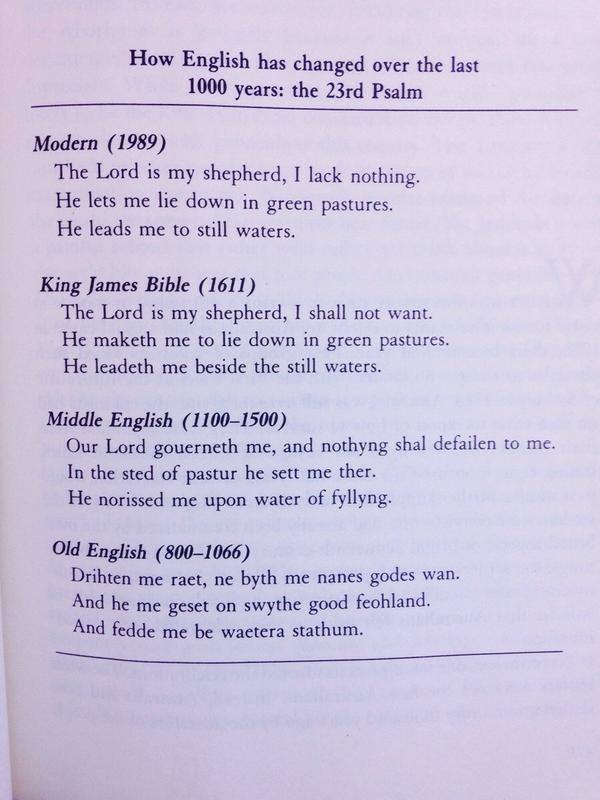|
This is a short example of how languages change thoughout the years. Language is a living organism and should treat it kindly.
0 Comments
How good are your grammar and punctuation skills?
Take the test and find out here Cuzband: cousin husband, a husband who is also your first cousin. Common in many countries.
Example: Heba, wouldn't you love to have a cuzband someday soon? An outline of the British Literature
Old English (Anglo-Saxon Period) writers: Caedmon and Cynewulf. work: Beowulf (by anonymous). 1200-1500: Middle English Period Geoffrey Chaucer (1343-1400) : The Canterbury Tales, Troilus and Criseyde and Book of the Duchess. Other Major Poems The House of Fame, The Parliament of Fowles, The Legend of Good Women. Prose Treatises Treatise on the astrolabe. Short Poems The Complaint of Chaucer to His Purse ,Truth, Gentilesse, Merciles Beaute, Lak of Stedfastnesse, Against Women Unconstant. Thomas Malory (1405-1471) : Morte d'Arthur. work: Sir Gawain and the Green Knight (by anonymous). 1500-1660: The English Renaissance 1500-1558: Tudor Period (Humanist Era) The Humanists: Sir Thomas More (1478-1535) : Utopia, The History of King Richard the Third, The Life of Pico della Mirandola, The Four Last Things, A Dialogue Concerning Tyndale, The Confutation of Tyndale's Answer, A Dialogue of Comfort Against Tribulation and Sadness of Christ. John Skelton (1460-1529): A ballade of the Scottysshe Kynge Sir Thomas Wyatt (1503-1542): My Lute Awake! Once, As Methought, Fortune Me Kissed They Flee From Me The restful place ! renewer of my smart It may be good, like it who list In faith I wot not what to say There Was Never Nothing More Me Pained Patience ! though I have not Though I Cannot Your Cruelty Constrain Blame Not My Lute My Pen ! Take Pain The heart and service to you proffer'd Is It Possible? And Wilt Thou Leave Me Thus? Since so ye please to hear me plain Forget Not Yet The Tried Intent What Should I Say! The Renaissance Period consists of four subsets: 1. 1558-1603: The Elizabethan Age (High Renaissance) William Shakespeare (1564-1616): Comedies: All's Well That Ends Well, As You Like It, The Comedy of Errors, Love's Labour's Lost, Measure for Measure, The Merchant of Venice, The Merry Wives of Windsor, A Midsummer Night's Dream, Much Ado About Nothing, The Tempest, Twelfth Night, or What You Will, The Two Gentlemen of Verona, The Two Noble Kinsmen, The Winter's Tale Histories: King John, Richard II, Henry IV, part 1, Henry IV, part 2, Henry V, Henry VI, part1, Henry VI, part 2, Henry VI, part 3, Richard III,Henry VIII Tragedies: Romeo and Juliet, Coriolanus, Titus Andronicus, Timon of Athens, Julius Caesar, Macbeth, Hamlet, Troilus and Cressida, King Lear, Othello, Antony and Cleopatra.Poems: Shakespeare's Sonnets, Venus and Adonis, The Rape of Lucrece, The Passionate Pilgrim, The Phoenix and the Turtle, A Lover's Complaint. Christopher Marlowe (1564-1593): The Tragical History of Doctor Faustus The Jew of Malta Massacre at Paris Tamburlaine the Great, Part 1 Tamburlaine the Great, Part 2 Lucan's First Book Edward II Dido Queen of Carthage Hero and Leander Ovid's Elegies The Passionate Shepherd to his Love Edmund Spenser (1552-1599): The Faerie Queene, Iambicum Trimetrum, The Shepheardes Calender. Sir Walter Raleigh (1552 – 1618): What is Our Life, The Ocean to Cynthia and The Lie. Ben Jonson (1573-1637): An Hymn to God the Father An Hymn on the Nativity of My Savior An Epitaph on Master Vincent Corbet On the Portrait of Shakspeare To the Memory of My Beloved the Author, Mr. William Shakespeare To Mr. John Fletcher, Upon His "Faithful Shepherdess" Epitaph on the Countess of Pembroke Epitaph on Michael Drayton To His Much and Worthily Esteemed Friend, the Author To My Worthy and Honored Friend, Master George Chapman 2. 1603-1625:The Jacobean Age {Mannerist Style (1590-1640) other styles: Metaphysical Poets; Devotional Poets} John Donne (1572-1631): Song A Hymn to God the Father Death, Be Not Proud Confined Love The Dissolution Oh my black soul! now art thou summoned Father, part of his double interest A Hymn to Christ at the Author's Last Going into Germany Francis Bacon (1561-1626): The Advancement of Learning, The Essays, The New Atlantis, Valerius Terminus of the Interpretation of Nature Thomas Middleton (1580-1627): The Phoenix Michaelmas Term A Mad World, My Masters A Trick to Catch the Old One The Puritan 3.1625-1649: The Caroline Age : John Ford, John Milton John Milton (1608-1674): Lycidas, Paradise Lost, Paradise Regained John Ford (1586-1640): Fame's Memorial Christ's Bloody Sweat, attr. Honour Triumphant The Witch of Edmonton The Sun's Darling The Lover's Melancholy Contention of a Bird and a Musician The Broken Heart A Bridal Song Love's Sacrifice 'Tis Pity She's a Whore Perkin Warbeck The Fancies, Chaste and Noble The Lady's Trial 4. 1649-1660: The Commonwealth Period (which is also known as the Puritan & The Protectorate Baroque Style, and later, Rococo Style) The Neoclassical Period: political writings of John Milton, Thomas Hobbes' political treatise Leviathan, and the prose of Andrew Marvell. Andrew Marvell (1621-1678): To his coy mistress The Neoclassical Period can be divided into three subsets: 1. 1660-1700: The Restoration: John Milton (1608-1674): Paradise Lost and Paradise Regained. John Dryden (1631-1700), John Wilmot 2nd Earl of Rochester (1647–1680), satirical poet John Locke 2. 1700-1800: The Eighteenth Century (The Enlightenment; Neoclassical Period; The Augustan Age) The Augustan Age: Daniel Defoe: Robinson Crusoe, (first English novels by Defoe) Samuel Richardson, Pamela Alexander Pope (1688-1744): An Essay on Criticism The Rape of the Lock The Dunciad Jonathan Swift (1667-1745): A Modest Proposal Gulliver's Travels Lady´s Dressing room Strephon and Chloe Cassinus and Peter 3. The Age of Sensibility. Henry Fielding (1707-1754) Tom Jones. Samuel Johnson (1709-1784): A Dictionary of the English Language To the Right Honorable the Earl of Chesterfield 1785-1870: Romanticism (The Age of Revolution) William Blake, William Wordsworth, S.T. Coleridge, George Gordon Byron, Percy Bysshe Shelley, John Keats, Jane Austen. William Wordsworth (1770-1850): London 1802 Ode: Intimations of Immortality The Prelude To a Skylark Tintern Abbey Samuel Taylor Coleridge (1772 – 1834): The Rime of the Ancient Mariner Chrisabel Kubla Khan George Gordon Byron (1788-1824): Childe Harold's Pilgrimage Don Juan Song for the Luddites The Isles of Greece Percy Bysshe Shelley A Refutation of Deism: In a Dialogue Alastor, or The Spirit of Solitude Wolfstein; or, The Mysterious Bandit The Daemon of the World Mont Blanc Hymn to Intellectual Beauty Laon and Cythna; or, The Revolution of the Golden City: A Vision of the Nineteenth Century The Revolt of Islam, A Poem, in Twelve Cantos History of a Six Weeks' Tour Jane Austen Sense and Sensibility Pride and Prejudice Mansfield Park Emma Northanger Abbey Persuasion 1870-1914: Victorian Period (Early, Middle and Late Victorian) Charles Dickens, the Brontës, George Eliot, Robert Browning, Alfred, Lord Tennyson, Thomas Hardy. Charles Dickens (1812-1870): Great Expectations Hard Times The Old Curiosity Shop Dombey and Son A Tale of Two Cities Oliver Twist George Eliot (1819-1880): Middlemarch The mill on the floss George Eliot Robert Browning (1812-1889): The Ring and the Book My Last Duchess 1914-1945: Modern Period George Bernard Shaw (1856-1950): Candida Pygmalion An Unsocial Socialist Arms and the Man Caesar and Cleopatra The Irrational Knot Cashel Byron's Profession William Butler Yeats (1865-1939): The Island Of Statutes Iris Fairy Tales On Baile' Strand The Hour Glass In The Seven Woods The Kings Treshold Reveries Over Childhood And Youth Responsibilities Sailing To Byzantium The Second Coming At The Hawk's Well D.H. Lawrence (1885-1930): Sons and Lovers Everlasting Flowers Elegy Discord in Childhood Dolor of Autumn Excursion Lady Chatterley's Lover Women in Love T.S.Eliot (1888-1965): The Love Song of J. Alfred Prufrock. Gerontion Sweeney Among the Nightingales The Waste Land The Hollow Men The Journey of the Magi Ash Wednesday |
AuthorAntonia Tsaknaki: she lives and works in Thessaloniki as an English teacher, translator, exams coach, proofreader. Her hobbies are literature, theater and linguistics. She is obsessed with commas and detests greeklish, since it upsets both languages and cause her eyes great pain! Archives
March 2016
Categories
All
|


 RSS Feed
RSS Feed
